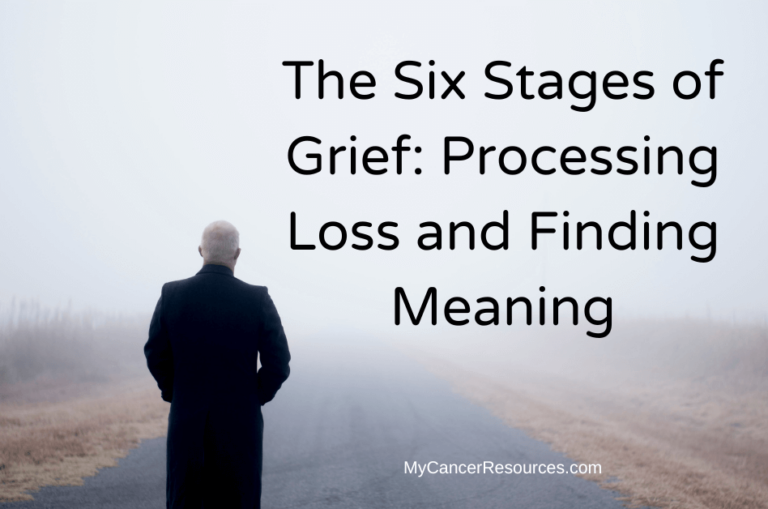
Many people assume that grief is only a reaction to death. In reality, it’s a response to all sorts of losses. Everyone reacts differently to grief, but there are some common stages that people go through. What are the six stages of grief? Let’s explore each of them and how they may relate to your cancer experience.
What is Grief?
Grief is a response to any type of loss. It can be an all-encompassing set of responses you have to the loss, and can include a range of emotions and physical responses. Social and behavioral responses can also arise as a result of your grieving process.
You don’t have to have lost someone to death or have a terminal illness in order to grieve. The loss of a job, a pet, or even the loss of a dream can lead to grief. The sense of loss doesn’t even have to make sense to someone else – what is important is that you are experiencing a loss, and your feelings around that loss are valid and important.
There are many types of grief and loss that people with cancer and their caregivers experience, including anticipatory grief, complicated grief, cumulative grief and ambiguous grief, among others. These different types of grief will be covered in other blog posts.
The Original Stages of Grief Model
The idea of needing to work through grief was first proposed by Sigmund Freud all the way back in 1917. The next big event in the field of grief work came many years later, in 1969.
Elisabeth Kubler Ross, a Swiss-American psychiatrist, published her groundbreaking book that year, titled On Death and Dying. This book was a result of years of working with terminally ill patients and exploring the thoughts and reactions they had about their impending death.
The Kübler-Ross model describes various stages of grief and the intense emotions that can occur at each stage. The stages she identified were denial, anger, bargaining, depression, and acceptance.
Hers is now one of the most well-known models of the five stages of loss. Mental health professionals regularly refer to this model when working with a grieving person.
I, too, refer to this model when working with clients. I help people with cancer and their caregivers name their loss or losses, and identify which of the grief stages they’re currently experiencing.
I then help them process the different types of emotional pain they may be feeling. I teach them new coping skills and provide support and encouragement as they do the hard work of processing their loss and moving through their grief journey.
It’s important to remember that these are non-linear stages, meaning that you don’t necessarily follow the model of grief in this specific order. It’s also not a one-way process.
You may go through the stages in a different order, bounce back and forth between stages, and even return to a previous stage later on. Let’s explore these stages in more detail.
Denial
The first stage of grief is the denial stage. This is when you experience a rush of feelings, including shock and disbelief.
For example, after receiving a cancer diagnosis, you might say, “This can’t be happening.” Or “I’m too young to have cancer – they’ve gotten my results mixed up with someone else.”
Denial is a natural defense mechanism – there’s only so much a person can handle at one time, so this denial gives you time to adjust to your new reality.
The time in this stage may be short, especially when faced with biopsy or scan results. But some people remain stuck in denial, which keeps them from moving forward and deciding on a treatment plan that works best for them.
Anger
In the anger stage of grief, people often get frustrated and lash out at others. They might say things like, “It’s not fair! I’ve always taken good care of my health – I shouldn’t have cancer!” They might direct their anger toward God or another higher power, medical staff, or even loved ones.
For those on the receiving end of the anger, though it can be hard, try to remember that it’s not about you or that you’ve done something wrong. Rather, remember that this anger is normal and a necessary part of the grief process.
That doesn’t give the grieving person the right to be physically, emotionally, or mentally abusive to you, though.
You don’t have to tolerate being treated poorly just because they are angry. You can set personal boundaries to support your grieving loved one while also protecting yourself.
Bargaining
The third stage is bargaining. A feeling of desperation may be so strong that you’d be willing to do just about anything to escape this reality. This is when people try to negotiate with a higher power or make deals in an effort to avoid the reality of the situation.
For example, you might beg your higher power, “If I do ______, then will you take my cancer away?” These thoughts and feelings are common, but it’s important to remember that we cannot control everything in life.
Depression
The fourth stage of grief is depression. This often happens when the reality of the situation sets in, and you realize the denial and bargaining aren’t working.
Feeling sick or having no energy as a result of cancer treatment can make depression even worse.
You might feel hopeless and numb, lose interest in activities you once enjoyed, and don’t want to face the world.
Again, this is a normal part of grieving, but it is also important during this time to reach out for help if needed and lean on loved ones for support.
For caregivers, in this stage, it is important to make sure your loved one doesn’t fall into a deep depression, so much so that it’s difficult for them to complete simple daily tasks.
If depression has taken over to where they are impaired, seek out the help of a mental health expert or doctor. Psychological help in the form of therapy and medications may be needed to address clinical depression so that the person can begin to function again in their day-to-day life.
Acceptance
The final stage in the original phases of grief model is acceptance. This stage is one that seems to have a lot of confusion surrounding it.
Acceptance doesn’t mean that you’re happy about your diagnosis and doesn’t mean that everything is now all right.
It’s not “It’s ok that I have cancer”, but rather “I have cancer, and I’m going to be ok.”
Acceptance is coming to terms with your diagnosis. You are learning to adjust to life with cancer.
It may even involve gaining new strength by becoming empowered around your diagnosis.
This could mean you’re more involved in decision-making about treatments and learning to advocate for yourself with the healthcare team and with your caregiver.
You can’t change the fact that you have cancer, but you can have a say in how you’re going to let cancer affect the other areas of your life.
The Sixth Stage of Grief
The sixth stage of grief is Finding Meaning. This stage was introduced by David Kessler, who co-wrote the book On Grief and Grieving with Elisabeth Kübler-Ross. They finished the book shortly before her death in 2004, and the book was published in 2005.
Some time after her death, Dr. Kübler-Ross’ family gave him permission to add the sixth stage to her model. He describes this sixth stage in his book, Finding Meaning: The Sixth Stage of Grief, which was published in 2019.
Kessler is no stranger to grief. As a child, his mother was dying in the hospital. At the same time, Kessler, at just 13 years old, witnessed a fire and a mass shooting in the hotel across the street from the hospital.
Kessler spent years teaching and training on end-of-life, grief, and trauma. His world was rocked again by the sudden death of his 21-year-old son.
Kessler says that finding meaning in the loss can transform grief into a more hopeful and peaceful experience.
So, despite dealing with cancer, Kessler recommends finding, naming, and creating meaningful moments.
Finding meaning for you may look like taking a leap you’d previously been too scared to take and living with more purpose and joy.
It could be raising money to fund research to find more effective and less toxic treatment options.
It could be fulfilling a bucket list wish in memory of a friend with cancer who wasn’t able to complete their own bucket list.
Finding meaning doesn’t need to involve a big project – meaning can also be found in the small moments, reflecting on memories, appreciating the new friends you’ve made in this club you never asked to join, and looking forward to the events and activities you plan to do with these new friends and your loved ones in the future.
According to Kessler:
- Meaning is relative and personal.
- Meaning takes time. You may not find it until months, or even years, after a loss.
- Meaning does not require understanding. Understanding isn’t necessary.
- Even when you do find meaning, you will not feel that it was worth the cost of what you lost.
- Your loss is not a test, a lesson, or something to handle. It is also not a gift.
- Only you can find your own meaning.
- Meaningful connections can heal painful memories.
Final Thoughts
Grief is a complex emotion that everyone experiences differently. There is no wrong way to grieve, but there are some common stages that people go through, including denial, anger, bargaining, depression, acceptance, and finding meaning.
Don’t think that there is only one way to grieve or that you have to work through the stages of grief in a specific order or on a specific timeline.

